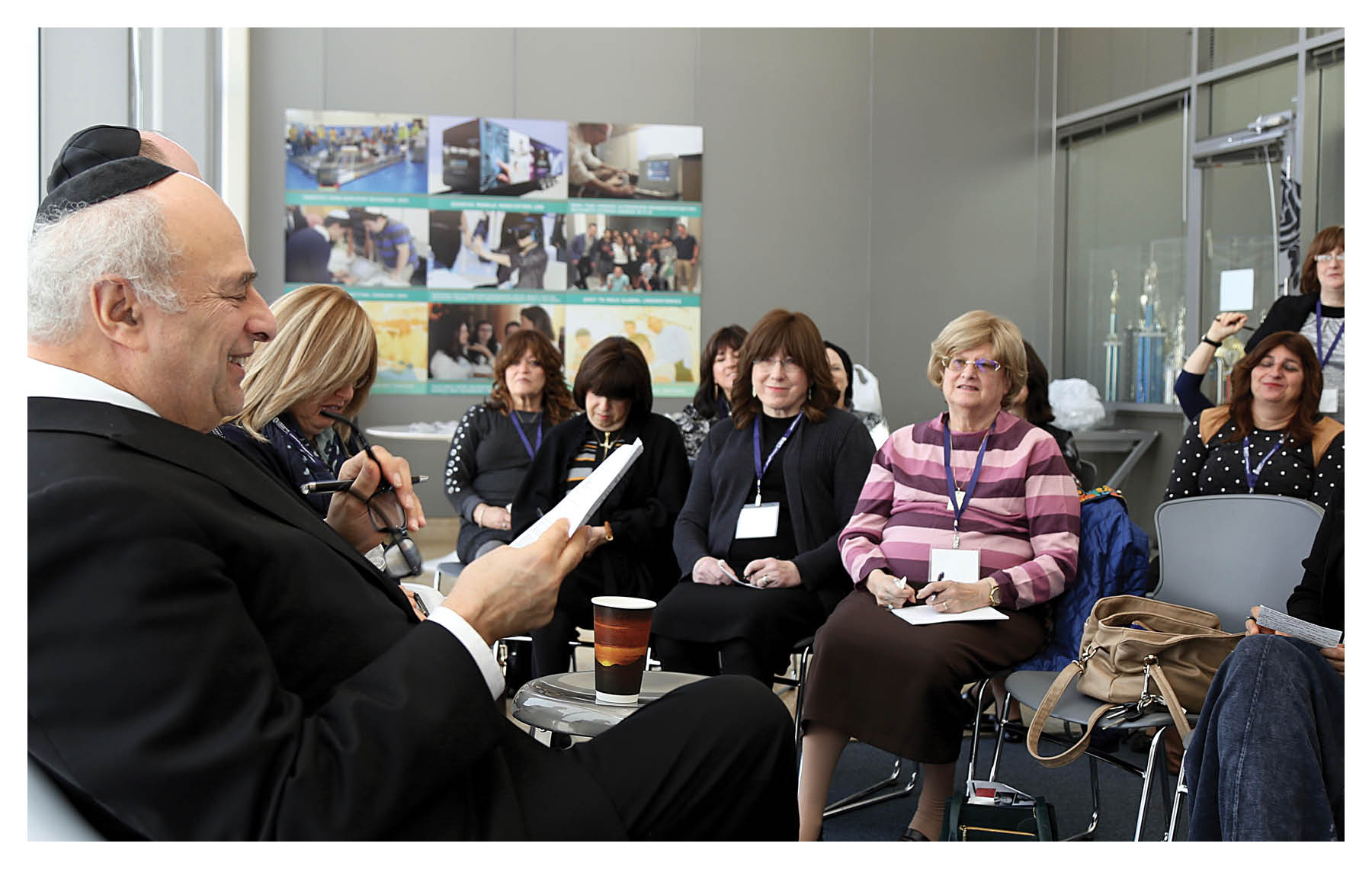 Attendees at the Orthodox Union’s second annual Torah LA project
Attendees at the Orthodox Union’s second annual Torah LA project At a Dec. 14 Friday night tisch at Young Israel of Century City, Rabbi Moshe Weinberger of Aish Kodesh in Woodmere, N.Y., emphasized the need for people to devote more time to face-to-face encounters: between spouses, between parents and children and between individuals and God.
Weinberger made his comments as part of the Orthodox Union’s second annual Torah LA project, held over the Dec. 14-16 weekend at synagogues throughout the city. The event culminated with a series of classes on Dec. 16 at Yeshiva University of Los Angeles Boys High School (YULA).
This year’s theme was “Strengthening Our Families.” Steering Committee member Yaakov Siegel said of the theme, “We are all very focused on improving our family relationships and our best resource is guidance from Torah leaders.”
Highlights of the day included Stern College for Women professor Rabbi Lawrence Hajioff, who spoke about achieving peace within marriage. The author of “Will Jew Marry Me? A Guide to Dating, Relationships, Love, and Marriage,” Hajioff said the mindset of our disposable culture contributes to unhappy marriages.
“The three things that keep a marriage strong are healthy self-love, commitment and trust,” he said. “Strongly connected couples show ‘intentionality,’ so that instead of hugging for only two seconds, they hug for 10. Don’t be afraid to be the one who loves the most.”
In a session titled “Save a Family — Save a Dynasty,” Geraldine Weiner taught a section from the Book of Samuel, focusing on Avigayil, the wife of the cruel Naval, who refused to give the secretly anointed David and his army provisions as they ran for their lives from Shaul. When David vows to kill Naval, it is Avigayil who stops him. Avigayil also goes on to marry David.
“[Avigayil] successfully used her many talents to negotiate a balance between the two conflicting sides of loyalty to her husband and family,” Weiner said. “She helped David succeed in his kingship and preserved his dynasty.”
Addressing the subject of “Raising honorable menschen,” Dr. David Pelcovitz, the Gwendolyn & Joseph Straus Chair in Psychology & Jewish Education at Yeshiva University, listed three keys to success in parenting: letting children learn from their mistakes, keeping expectations high for moral and ethical behavior and conveying our values through our emotional reactions to things.
“We are all very focused on improving our family relationships and our best resource is guidance from Torah leaders.” — Yaakov Siegel
“Everyone makes mistakes,” Pelcovitz said. “We rob our children of the ability to grow unless we let them fail and learn from their errors. Our children’s moral development depends on it. Saying, ‘You’re better than this,’ with calm and gentle disappointment but not anger, helps them develop morally.”
Parents should also convey confidence that their children can succeed, he said, noting, “If you believe in somebody and believe they have the ability to act a certain way, it can become self-fulfilling.”
Pelcovitz also discussed helping children “build their ethical decision-making muscle” by talking with them about halachic and ethical dilemmas they have faced. He said doing so with his children and grandchildren has brought him closer to them.
Pelcovitz was also one of the presenters at a special session for rabbis’ wives on combatting spiritual apathy. He suggested rebbetizins could act as mentors by standing by a person, not over the person. “True connections grow between people when we allow them to be imperfect … and allow ourselves to be imperfect too,” he said. They do not grow if we seem to be trying to “force” spirituality on them.
Rabbis’ wives, who perform double and often triple duty with their own jobs, as mothers, and as unpaid counselors for their congregations, also need to carve out time for themselves. Said Pelcovitz, “Stillness and tranquility lead to spirituality.”
In summing up the theme of “Strengthening Families,” Pelcovitz perhaps said it best when he spoke about fostering strong relationships with your children from an early age.
As a kid, Pelcovitz said he always was embarrassed when he won the “good middos” (character) award at camp, when most of the other kids valued the awards for sports.
“When my parents saw my reaction, they held up the award with tears in their eyes and told me, ‘This is everything to us.’ If parents show more emotion over material prizes than spiritual ones, they are sending the wrong message.”
To watch videos of the presentations, visit ou.org/torahla.
Judy Gruen is the author of “The Skeptic and the Rabbi: Falling in Love With Faith.”























 More news and opinions than at a Shabbat dinner, right in your inbox.
More news and opinions than at a Shabbat dinner, right in your inbox.